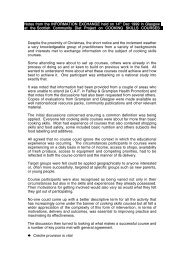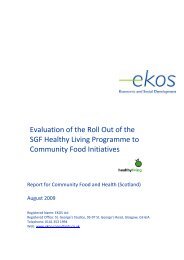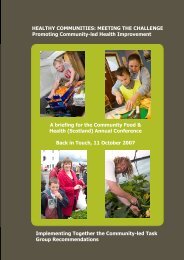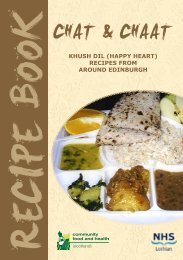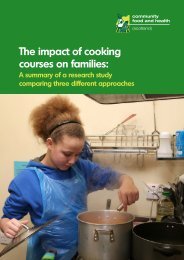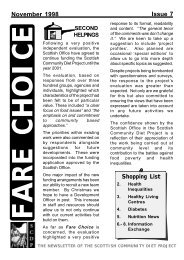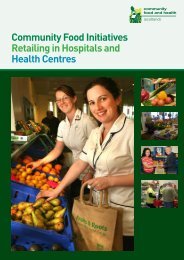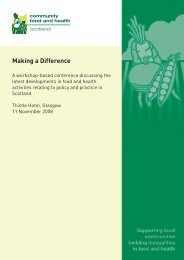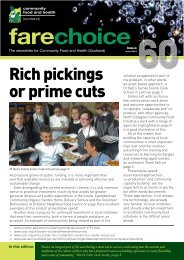North Glasgow Youth Food Guidelines and Healthy Eating Toolkit
North Glasgow Youth Food Guidelines and Healthy Eating Toolkit
North Glasgow Youth Food Guidelines and Healthy Eating Toolkit
Create successful ePaper yourself
Turn your PDF publications into a flip-book with our unique Google optimized e-Paper software.
15 - 16 <strong>North</strong> <strong>Glasgow</strong> <strong>Youth</strong> <strong>Food</strong> <strong>Guidelines</strong> <strong>and</strong> <strong>Healthy</strong> <strong>Eating</strong> <strong>Toolkit</strong><br />
BUDGETING<br />
The cost of healthy eating is often a key barrier to young people trying<br />
to achieve a healthy diet. This exercise aims to get the young people<br />
thinking of ways to eat healthily on a budget, <strong>and</strong> to show that making<br />
home cooked versions of takeaways is more cost effective <strong>and</strong> much<br />
better for you too.<br />
Top tips for eating a<br />
healthy diet on a budget<br />
(from the ACES childhood<br />
obesity programme)<br />
Ask the group to come up with their suggestions <strong>and</strong><br />
start to create a list on a flip chart. Here are some tips<br />
to get you started:<br />
1. Pre-plan your weekly menu: this way you can make<br />
sure all your meals are healthy <strong>and</strong> plan how much<br />
you are going to spend.<br />
2. Be wise to supermarket tactics: check the top<br />
<strong>and</strong> bottom of the aisles for special offers, though<br />
remember BOGOF is only a bargain if you are going<br />
to eat all of it!<br />
3. Don’t shop when you are hungry: you are more likely<br />
to buy things you don’t need.<br />
4. Use frozen fruit <strong>and</strong> veg: these save waste <strong>and</strong> are<br />
just as healthy as fresh.<br />
5. Tinned fruit <strong>and</strong> veg are a great store cupboard<br />
item: make sure you choose those in fresh water, not<br />
salt or sugar/syrup.<br />
6. Go seasonal: fresh fruit <strong>and</strong> veg are always cheaper<br />
in season.<br />
7. Invest in good quality lean meat: lean turkey is<br />
by far the cheapest as an alternative to chicken.<br />
Home Cooked vs. Takeaways<br />
For this exercise you’ll need to collect a sample of<br />
local takeaway menus <strong>and</strong> print off the costs of the<br />
necessary ingredients from an online supermarket.<br />
Alternatively if you have access to computers get<br />
the young people to choose the dish they’d have<br />
from a takeaway then look up the ingredients needed<br />
online, or arrange a visit to your local supermarket.<br />
Discussion:<br />
• What costs more: home cooked or takeaway?<br />
• Which do you think would be healthier? Why?<br />
• What store cupboard items (e.g. rice, tinned<br />
tomatoes) could you use to make your takeaway?<br />
How does this save you money?<br />
If possible cook one of the ‘takeaways at home’ recipes<br />
alongside this session.<br />
TAKEAWAY<br />
(SERVES 1)<br />
SUPERMARKET<br />
(SERVES 2)<br />
Chicken Tikka Masala: £7 Chicken Breast: £2.50 (for 2)<br />
Boiled Rice: £1.60 Onion: £0.15<br />
Naan Bread: £1.70 Pepper: £0.70<br />
GROW YOUR OWN<br />
Whatever the space you have, either indoors or outdoors there is<br />
something that will grow! Here are some ideas from the Children’s<br />
Inclusion Partnership, who have worked on growing projects with<br />
young people in <strong>North</strong> <strong>Glasgow</strong>.<br />
Strawberries<br />
Strawberries can be grown in containers, pots <strong>and</strong><br />
hanging baskets. They like sunshine <strong>and</strong> well drained<br />
soil, but not too rich as it makes too much foliage<br />
<strong>and</strong> not enough fruit.<br />
• Sunlight will ripen the fruit.<br />
• Plant in summer about 30cm apart.<br />
• Straw under plant helps to deter slugs.<br />
• Water frequently.<br />
• After cropping cut plant back <strong>and</strong> use the runners to<br />
make plants for next year. The plants will last 3 years.<br />
‘Cut <strong>and</strong> come again’ lettuce<br />
• Sow from March to September.<br />
• Start off indoors on a window ledge or outside<br />
in a ‘mini greenhouse’.<br />
• Water frequently.<br />
• When 15-25cm high cut the leaves but leave enough<br />
to encourage more growth.<br />
• Can be grown all summer <strong>and</strong> takes 6 weeks from<br />
sowing to harvest.<br />
Potatoes<br />
“CHITTING”: Before we put seed potatoes in the<br />
ground we “chit” them. Buy your seed potatoes:<br />
• Put them in an open egg box.<br />
• Keep them cool <strong>and</strong> out of direct sunlight.<br />
• When sprouts of about 2.5 cm appear, they are<br />
ready to be planted, either directly in the soil or<br />
in a bucket or rubble bag.<br />
Early potatoes can be planted in March <strong>and</strong> main crop<br />
in April. Potatoes need water <strong>and</strong> fertile soil so feed<br />
with a liquid fertiliser <strong>and</strong> add organic matter to the<br />
soil when you plant them.<br />
“EARTHING UP”: Potatoes need to be earthed up<br />
every now <strong>and</strong> again. This means putting earth over<br />
the growing shoots as they grow out of the ground.<br />
The potatoes are ready when the plants have<br />
flowered <strong>and</strong> the stalks start to die back.<br />
8. Save on waste: cook in bulk <strong>and</strong> freeze portions<br />
for another day.<br />
Jar Tikka Masala Sauce: £0.73<br />
Basmati Rice: £0.82 (500g)<br />
Naan Bread: £0.69 (for 2)<br />
Total: £10.30<br />
Total: £5.59



